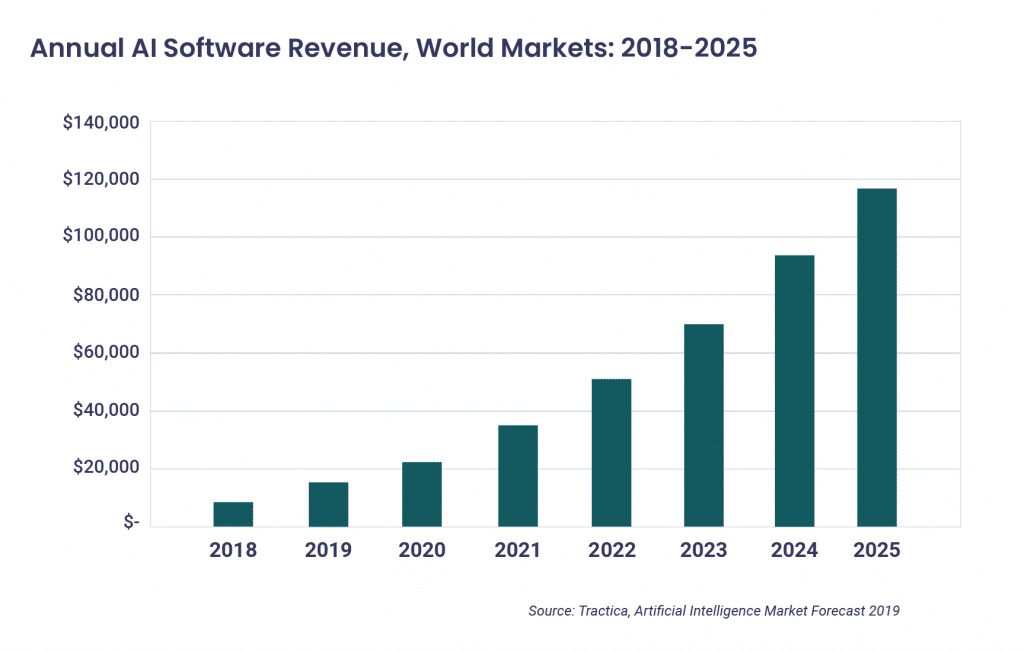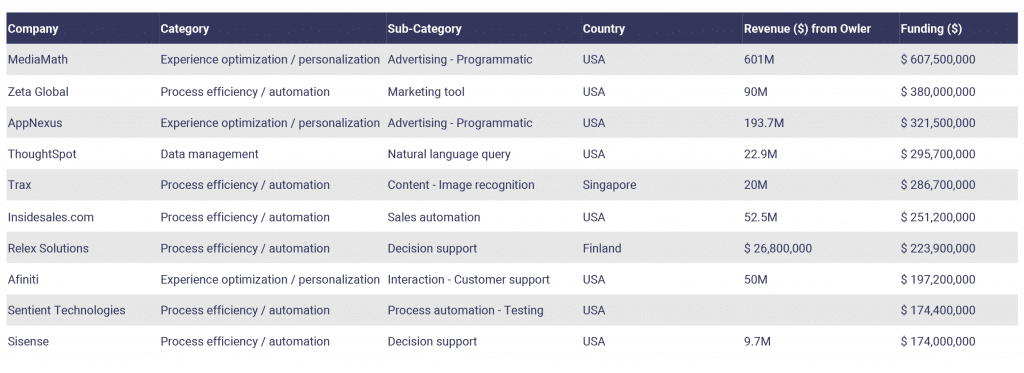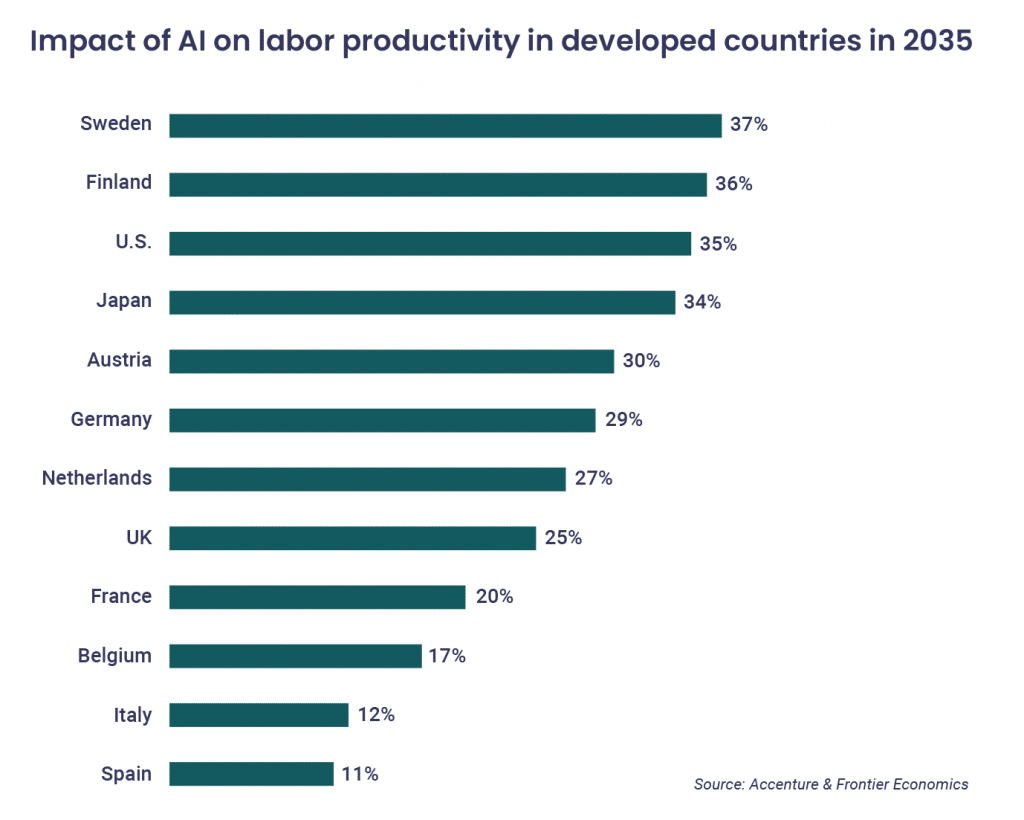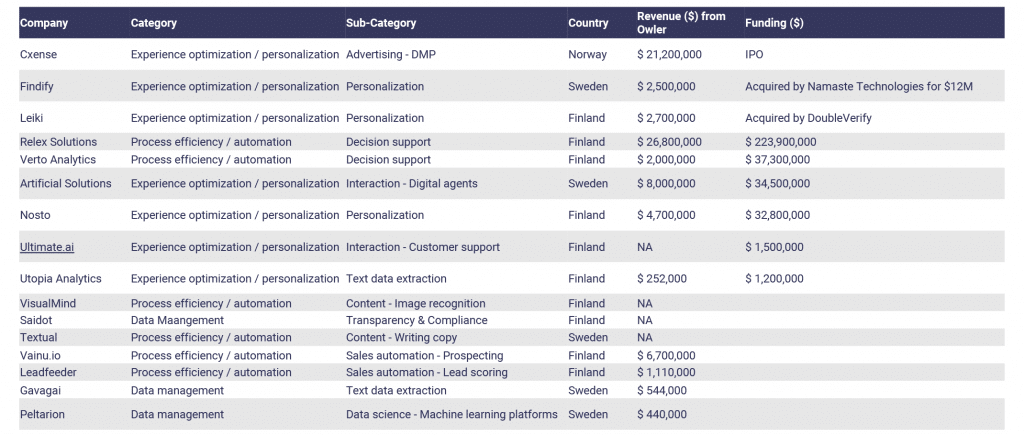Avaus’ team has focused on mapping AI solutions this time in our series of marketing technology landscapes. This first-ever published AI Marketing Landscape tells a compelling story about the new urgency of data and analytics in all areas of business, enterprise, SME and smaller. As we speak, the Landscape is evolving. Adoption of AI tools and technologies is gaining speed, and the Landscape is, as of this writing, for sure already wanting.
The AI-based solutions are proliferating on the SAAS market as ever more new AI-pureplay entrants compete with AI-upgraded older incumbents. Most of the buzz can be attributed to real advances in analytics tools development, but simultaneously, the AI frenzy should partly be attributed to current branding concerns. Everyone in town today needs to wear the AI inside-tag.
The biggest domain within the AI landscape is marketing and customer engagement solutions. Within this domain, we found three different subdomains:
1. Experience optimisation and personalisation
General marketing and customer engagement, personalisation, digital advertising, sales and customer care management and automation. These solutions are implemented on top of existing data platforms, existing customer databases, DMP’s or Google Analytics.
2. Process efficiency and automation
Marketing processes and decision tools (Sales, Marketing, Customer Care), Tools for sales, content development, management, decision support, automation algorithms of Martech stacks.
3. Data Management
Tools for managing data assets and – data capture, voice recognition, social listening, Data management, ML, frameworks tools libraries, transparency and compliance.
Personalisation is the main theme though-out, whether it is in advertising, website, web store or mobile app. Good examples are Swedish Findify, Finnish, Leiki and Nosto (which has raised a total of $32,8M in funding), that all three belong to the personalisation category. The Swedish company Artificial Solutions is in the sub-category of interaction and digital agents.
According to market research firm Tractica the AI, the market is expected to grow eightfold, from an estimated present $15BN to close to $120BN in 2025. This represents a compound annual growth of 40+%. The broader market crosses all industries, and this Landscape represents only a fraction of the total, focusing on technologies mainly of relevance for customer engagement and marketing.

Natural language processing is developing rapidly and is required by several apps such as chatbots, digital agents, content creation, and data extraction. Programmatic advertising with an AI twist is already becoming old news, but US firms AppNexus and MediaMath, with a joint revenue of $800M, are in first and third place on the list of the best-funded companies of the Landscape.
Top 10 findings:

Process efficiency and automation will reduce costs and accelerate more intelligent working methods. According to an Accenture and Frontier Economics study (2019), the impact of AI on labour productivity in developed countries in 2035 is looking astonishing from a Nordic perspective. Sweden is scoring first (37%) and Finland second (36%), with the U.S. in third place (35%).

Nordic AI Companies in 2019

Personalisation is the main theme throughout, whether in advertising, web site, web store or mobile app. Good examples are Swedish Findify, Finnish, Leiki and Nosto (that has raised a total of $32,8M in funding), that all three belong to the personalisation category. The Swedish company Artificial Solutions is in the sub-category of interaction and digital agents.
Process automation and efficiency will eliminate time-consuming, repetitive tasks for sales reps such as scheduling and prospecting. Good examples are US firms Insidesales.com ($251M funding) and Seismic ($164,5M), both focusing on sales automation. The first generation chatbots have received a lot of flak for their undeniably low IQ in many situations. Still, they will continue to improve customer care inroads with each new generation. They still provide a big potential for CX improvement, especially for SMEs: slacking CC staffing resources. A Swedish star seems to be Artificial Solutions with $34,5M in funding and $8M in revenues.
Many of the solutions in the Landscape pre-date the AI era. Some of the firms have simply added AI features and functionalities in their latest releases. An example of this is Adobe Experience Cloud and Salesforce Einstein. In a few cases, AI is pure cosmetics and plays a much smaller role than is claimed in the sales pitches.
Big or Small Brain?
The two main trends in enterprise AI-based analytics solutions are build or buy. The Landscape consists primarily of the latter – particular purpose solutions ready to run on the go. We call them Small Brain solutions. They are designed to do a job with a narrow scope or purpose, and they do not require big development efforts to implement.
General-purpose AI, we like to call Big Brain solutions. They reside primarily in the Data Management part of the Landscape. They represent framework technologies used for custom-built enterprise platforms such as the algorithms of big e-tailers like Zalando.
The AI-Landscape is also well-populated with different kinds of citizen data science solutions. They provide tools for the non-coding communities of analysts. Good examples are natural language query applications that make data more accessible to anyone with a question. The Swedish firm Peltarion (funding $36,8M) aims at bringing machine learning closer to business management. Peltarion has created an operational AI platform, easy to understand and run and that should lower the threshold of AI technology adoption for businesses, large or small. Avaus has published a partnership with Peltarion in early 2019.
These data citizen solutions are gaining ground as Data scientists tend to come from increasingly diverse backgrounds other than computer sciences. Many have degrees in macro-and microeconomics, physics or other natural sciences.
CMS-generated websites replaced a long time ago code based custom-coded solutions. In Data Science, this translates into today’s applications that enable sophisticated algorithm design without actually working with Python or other programming languages of choice in the Data Scientist community.
Off-the-shelf algos for sale
The Landscape also reveals a process of algorithm commoditisation. The ability to create a competitive advantage with pure algorithmics is becoming harder, as it will get increasingly easier to use prefab-algolibraries. The advantage is accordingly shifting towards proprietary data, as data cannot be copied and commoditised. The data advantage works on both macro and micro levels. The platform companies exemplify how huge data volumes beat everything in sight. This applies on company levels as well. Players with better and denser data will beat the competition in the following years to come.
An excellent example of commoditisation is RELEX Solutions, the Finnish super funded ($223.9M) AI-driven retail planning solution with algorithm libraries for almost any aspect of retailing – ranging from demand forecasting to workforce optimisation.
Transparency and compliance will play a more dominant role within the AI ecosystems in the future. The Finnish company Saidot is a good example of new solutions enabling the creation of trust and transparency of algorithms in an AI-driven world.
Avaus has developed its data science offering since 2016. Today Avaus analytics related revenue is about to eclipse revenues from martech implementation and development work. This reflects an overall shift in the market. Digitalisation has reached a point where most B2C and many B2B companies have implemented some basic engagement technologies and are now looking at how to ensure the yields of their investments. This has turned the focus on data and analytics.
Written by Tuukka Valkeasuo, Tom Nickels, Ola Ottosson, Katariina Lahdenpää
*The list does not cover all machine learning libraries. The Landscape gives insight on firms and categories and will be developed on-going as an open-source.
Get the list of companies, Landscape pictures in high resolution and material in PDF:
Download AI marketing landscape
Contact us